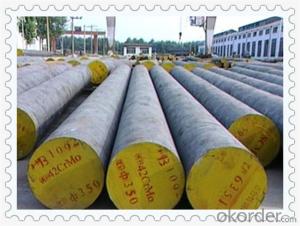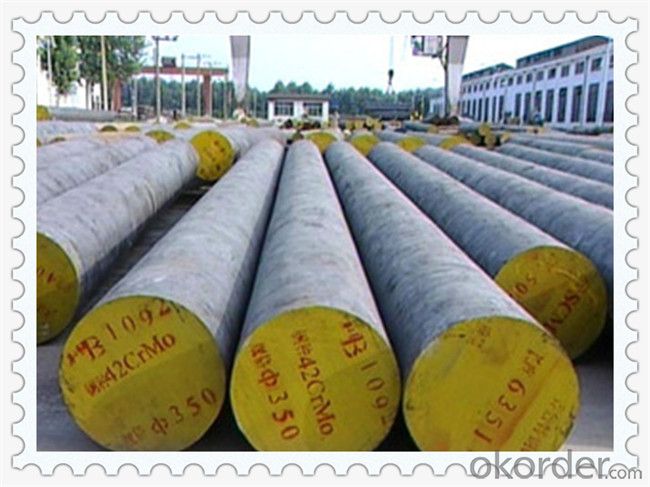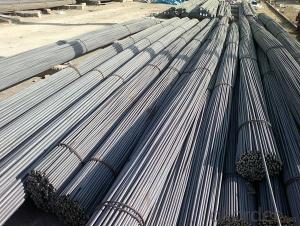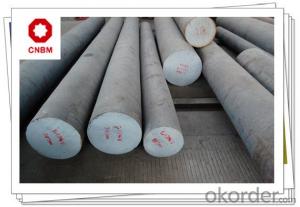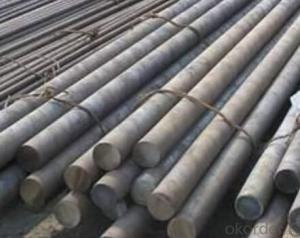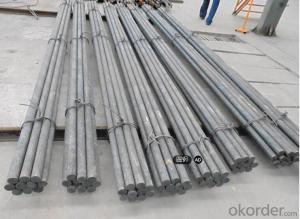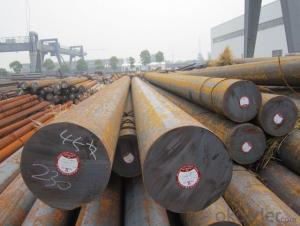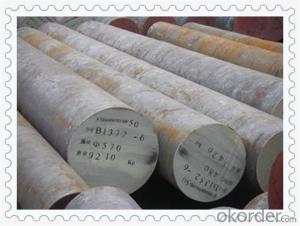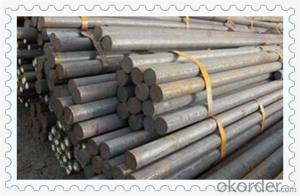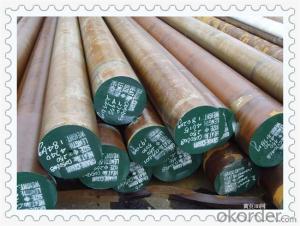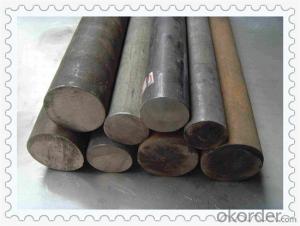AISI 1008 Carbon Steel Round Bars
- Loading Port:
- China main port
- Payment Terms:
- TT OR LC
- Min Order Qty:
- 30 m.t.
- Supply Capability:
- 10000 m.t./month
OKorder Service Pledge
OKorder Financial Service
You Might Also Like
AISI 1008 Carbon Steel Round Bars
Technical Paramenters
Diamater: Ø12mm-Ø650mm
Length: standard 6m,9m,12m, If you need special lengths,please call us.
Surface: Black, polished, grinded
Process: Hot rolled,cold drawn,forged
Inspection: UT test, mill test certificate, third party inspection such as SGS,BV etc.
Packing: In bundle, tied by steel straps, covered with protecting film
Use wooden box, fill with foam to keep the surface from damaging
Description | 1008 steel rould bar | |
Material | ASTM /AISI | 1005,1006,1008,1010,1015,1020,1025,1030,1035, 1040,1045,1050,1055,1060,1065,1070,1080,1084 |
DIN | Ck10,Ck15,Ck22,Ck25,Ck30,Ck35,Ck40,Ck45,Ck50, 30Mn4,40Mn4 | |
Standard | GB/T799,ASTM A29,A36,A108,A321,A575,BS970,DIN1652,JIS G4051 | |
Section shape | Round Other shape such as square,hexagonal,flat,angle | |
Surface | Black, galvanized,grinded, | |
Specifications | Round bar | Diameter: 12mm~650mm |
Angle bar | Size: 3mm*20mm*20mm~12mm*800mm*800mm | |
Square/ bar | Size: 4mm*4mm~100mm*100mm | |
Flat bar | Thickness: 2mm~100mm | |
Width:10mm~500mm | ||
Hexagonal | Size: 4mm~800mm | |
Length | Standard 6m,9m,12m or as required. | |
Trade terms | Payment terms | T/T,L/C,Western Union |
Price terms | FOB,CIF,CFR,EXW | |
Applications | Steel round bar is widely used for all general fabrication and repairs in industrial maintenance, agricultural implements, transportation equipment, ornamental work frame work, braces, supports, shafts,axels,etc. Hot rolled Steel round bars have a slightly grain textured finish. | |
Products Show
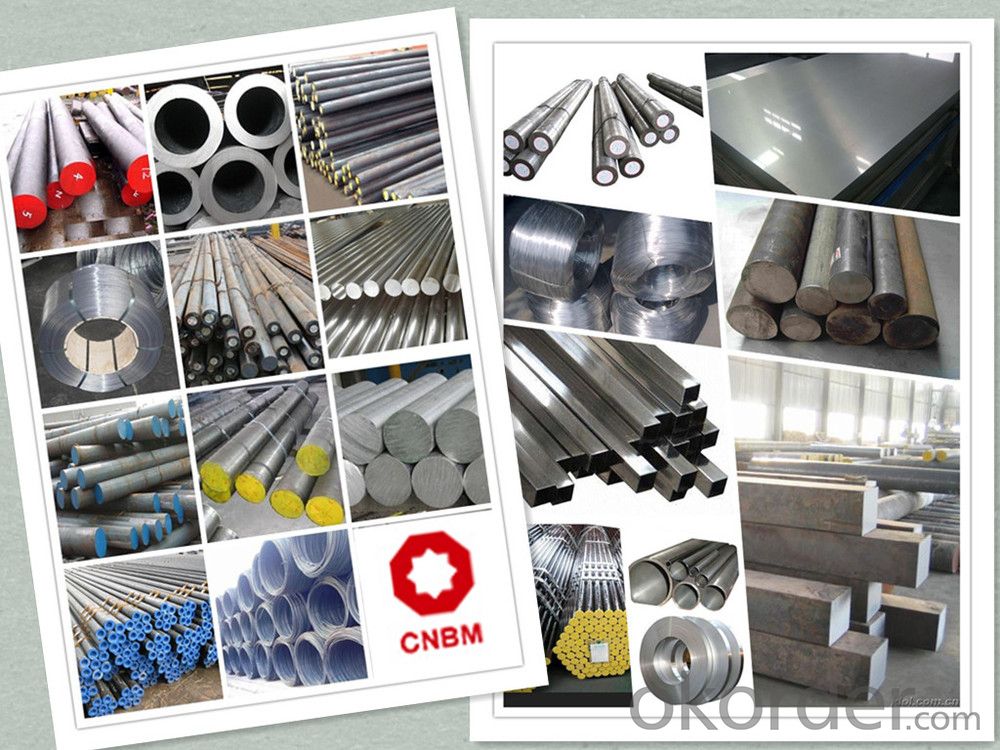
Product Overviews
| Product Name | Typical Grades | Diameter(mm) | Standard adopted |
| Carbon Steel | 20 (1020/S20C/C22) | Ø16-Ø300 |
GB/SAE/JIS/DIN
|
| 40 (1040/S40C/C40) | |||
| 45 (1045/S45C/C45) | |||
| Bearing Steel | GCr9 (51100/SUJ1) | Ø12-Ø250 | |
| GCr15 (52100/SUJ2/100Gr6) | |||
| GCr9SiMn (A485-Gr.1/SUJ3) | |||
Cr-Mo Steel | 20Cr (5120/SCr420H/20Cr4) | Ø12-Ø250 | |
| 40Cr (5140/SCr440/41Cr4) | |||
| 42CrMo(4140/SCM440/42CrMo4) | |||
| Gear Steel | 20CrNiMo | Ø16-Ø600 | |
| 20CrMn(5115/SMnC420/20MnCr5) | |||
| 20CrNiMo(8620/SNCM220/20CrMiMo2) |
Application
| Carbon Steel | Mold bottom, Plastic mold, Construction machinery parts Automobile parts, Security grills, Screens, Construction |
| Bearing Steel | Aerospace, Navigation, Nuclear energy, Chemical industry Electronic information, Petrochemical, Instrument and meter Transportation |
| Cr-Mo Steel | Mechanism & Fasteners gear, Stressed components for vehicles Engines and machines, Parts of larger cross-section |
| Gear Steel | All kinds of gears, Statically and dynamically stressed component for vehicles Engines and machine, Larger cross-section parts, Crankshafts |
Work Shop
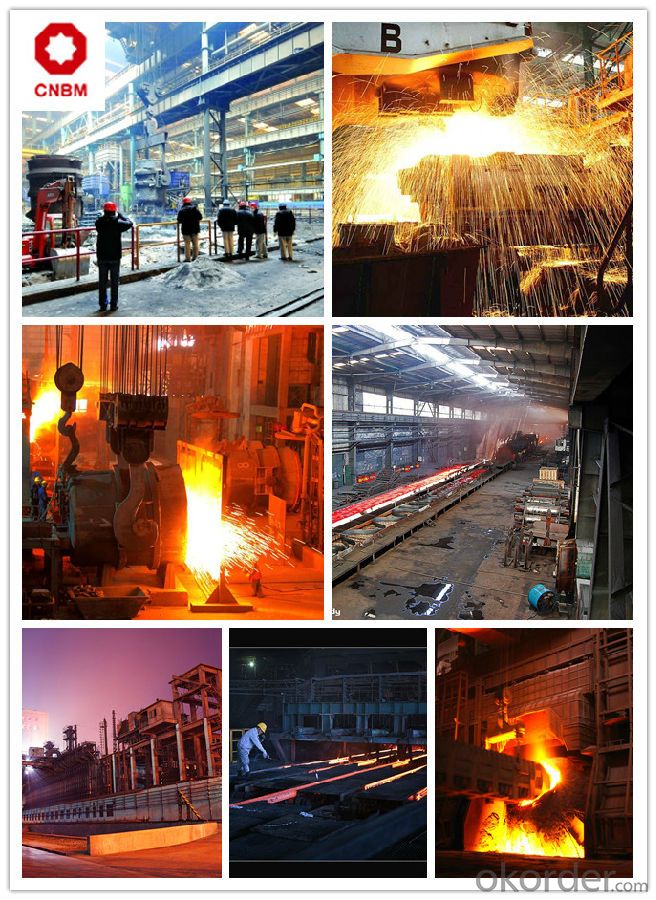
Company Information
CNBM International Corporation is the most important trading platform of CNBM group.
Whith its advantages, CNBM International are mainly concentrate on Cement, Glass, Iron and Steel, Ceramics industries and devotes herself for supplying high qulity series of refractories as well as technical consultancies and logistics solutions.

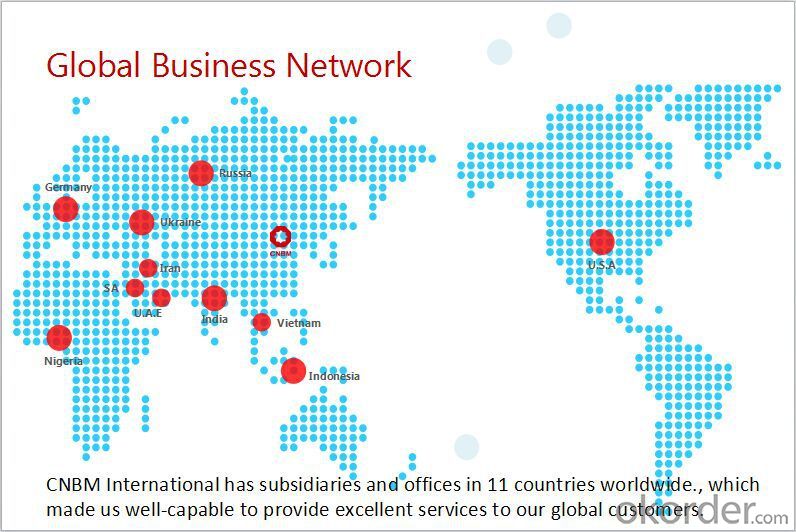
FAQ
1, Your advantages?
professional products inquiry, products knowledge train (for agents), smooth goods delivery, excellent customer solution proposale
2, Test & Certificate?
SGS test is available, customer inspection before shipping is welcome, third party inspection is no problem
3, Factory or Trading Company?
CNBM is a trading company but we have so many protocol factories and CNBM works as a trading department of these factories. Also CNBM is the holding company of many factories.
4, Payment Terms?
30% TT as deposit and 70% before delivery.
Irrevocable L/C at sight.
5, Trading Terms?
EXW, FOB, CIF, FFR, CNF
6, After-sale Service?
CNBM provides the services and support you need for every step of our cooperation. We're the business partner you can trust.
For any problem, please kindly contact us at any your convenient time.
We'll reply you in our first priority within 24 hours.
Packaging & Delivery
1, Packaging: seaworthy package or as required
2, Delivery: 35-45 days or based on quantity
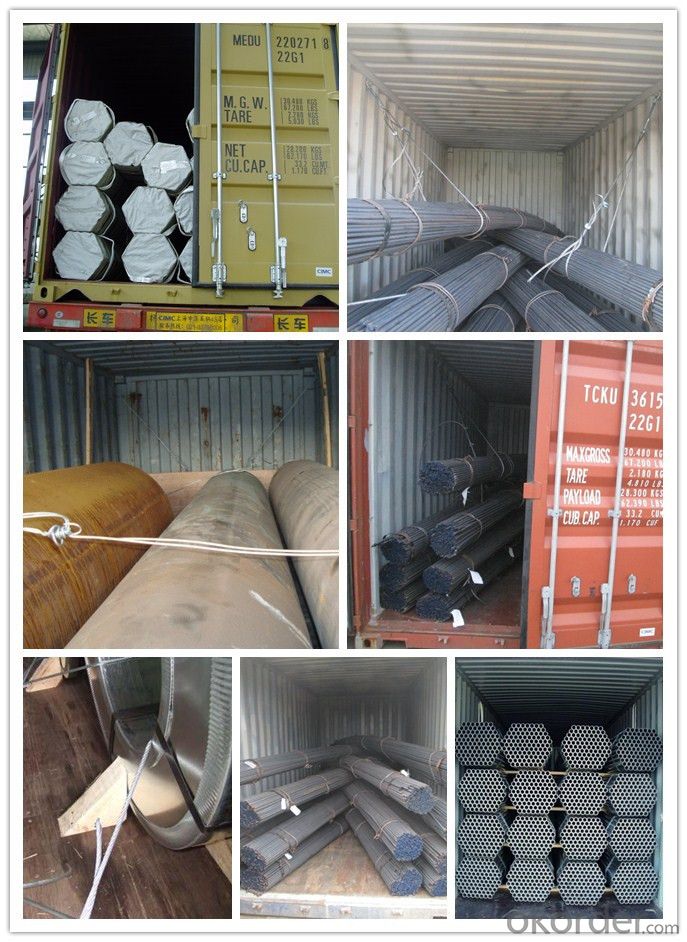
- Q: Can steel round bars be used in outdoor applications?
- Indeed, outdoor applications can make use of steel round bars. Steel, being a robust and long-lasting material, possesses corrosion resistance, thus rendering it suitable for outdoor purposes. Construction, manufacturing, and infrastructure projects frequently employ round bars to offer structural support and reinforcement. Furthermore, steel round bars exhibit the ability to withstand diverse weather conditions, such as rain, snow, and extreme temperatures, while retaining their strength and integrity. Nevertheless, it is crucial to carefully choose the most suitable type of steel for the specific outdoor application to guarantee optimal performance and longevity.
- Q: Can steel round bars be customized or fabricated?
- Yes, steel round bars can be customized or fabricated according to specific requirements. This can involve cutting, bending, drilling, welding, or other processes to achieve the desired shape, size, or design.
- Q: What are the different types of steel round bars used in the agricultural sector?
- In the agricultural sector, there are several types of steel round bars that are commonly used due to their strength, durability, and versatility. These bars play a crucial role in various agricultural applications. 1. Mild Steel Round Bars: Mild steel is one of the most widely used types of steel in the agricultural sector. It offers excellent strength and is relatively low in cost. Mild steel round bars are commonly used in the construction of agricultural equipment, such as plows, cultivators, and harrows. 2. Carbon Steel Round Bars: Carbon steel round bars are known for their high strength and toughness. They can withstand heavy loads and are ideal for applications that require superior durability. Carbon steel round bars are commonly used in the manufacturing of tractor parts, tillage tools, and other heavy-duty agricultural machinery. 3. Alloy Steel Round Bars: Alloy steel round bars are made by adding various alloying elements to steel, such as chromium, nickel, or molybdenum. These elements enhance the strength, hardness, and corrosion resistance of the steel. In the agricultural sector, alloy steel round bars are often used in the manufacturing of high-performance components, such as gears, axles, and shafts. 4. Stainless Steel Round Bars: Stainless steel round bars are highly resistant to corrosion and have excellent mechanical properties. They are commonly used in agricultural applications that require resistance to moisture, chemicals, and harsh environments. Stainless steel round bars are often utilized in the manufacturing of dairy equipment, storage tanks, and irrigation systems. 5. Tool Steel Round Bars: Tool steel round bars are specifically designed to withstand high temperatures, abrasion, and impact. They are used in agricultural applications that involve cutting, shaping, or drilling. Tool steel round bars are commonly used in the production of blades, cutting tools, and machinery parts for crop harvesting and processing. It is important to consider the specific requirements and conditions of each agricultural application when selecting the appropriate type of steel round bar. By choosing the right steel round bar, farmers and agricultural professionals can ensure the reliability and longevity of their equipment and machinery.
- Q: Can steel round bars be used in high-temperature environments?
- Yes, steel round bars can be used in high-temperature environments. However, the specific type of steel and its composition need to be carefully chosen to ensure it has the necessary heat resistance properties, such as high melting point and good strength retention at elevated temperatures.
- Q: Are steel round bars suitable for high-stress applications?
- Yes, steel round bars are suitable for high-stress applications. Steel round bars possess high tensile strength, durability, and resistance to deformation, making them ideal for withstanding heavy loads and intense pressure in various industries such as construction, manufacturing, and engineering. The robust nature of steel round bars ensures their suitability for high-stress applications.
- Q: What are the advantages of using sulfur-alloy steel round bars?
- Sulfur-alloy steel round bars offer several benefits. Firstly, they have superior machinability compared to other steel types. Adding sulfur to the alloy reduces friction between the tool and workpiece, resulting in smoother cutting and lower cutting forces. This simplifies and improves the efficiency of machining, saving time and reducing costs. Secondly, sulfur-alloy steel round bars possess excellent chip-breaking properties. The sulfur content encourages the formation of small, brittle sulfide inclusions within the steel, which act as effective chip breakers during machining. These inclusions break the chips into smaller pieces, preventing tangling and issues like built-up edges or poor surface finish. Another advantage is the improved surface finish of sulfur-alloy steel round bars. The sulfur content in the alloy minimizes the occurrence of built-up edges or burrs during machining. As a result, a smoother and more precise surface finish is achieved, which is particularly crucial for applications that require aesthetics or tight tolerances. Moreover, sulfur-alloy steel round bars exhibit good wear resistance. The sulfur content forms hard sulfide inclusions that enhance the hardness and wear resistance of the steel. This makes it suitable for applications subjected to abrasive wear, such as gear or bearing manufacturing. Lastly, sulfur-alloy steel round bars are frequently more cost-effective compared to other high-performance alloys. Adding sulfur is a relatively inexpensive process, making sulfur-alloy steel a more affordable option for many applications. This makes it an appealing choice for industries that require high-quality steel while considering costs. In conclusion, the benefits of using sulfur-alloy steel round bars include improved machinability, enhanced chip-breaking properties, better surface finish, good wear resistance, and cost-effectiveness. These advantages make sulfur-alloy steel round bars a popular choice in various industries, including automotive, aerospace, and manufacturing.
- Q: Are steel round bars resistant to chemicals or acids?
- Most chemicals and acids do not affect steel round bars, although the level of resistance varies depending on the specific steel type and the concentration and nature of the chemical or acid. Stainless steel round bars, on the other hand, have excellent resistance to corrosion and many types of acids. This makes them ideal for use in industries like chemical processing, food processing, and pharmaceuticals. However, it is worth noting that aggressive chemicals and acids, such as hydrochloric acid or sulfuric acid at high concentrations, can still cause corrosion or damage to steel round bars. In these instances, it is advisable to seek advice from experts or consult material compatibility charts to determine the most appropriate steel alloy for the intended application.
- Q: What are the tolerance levels for steel round bars?
- The tolerance levels for steel round bars can vary depending on the specific requirements and industry standards. Generally, the tolerance levels for diameter can range from +/- 0.001 inches to +/- 0.005 inches, while the tolerance levels for length can range from +/- 0.125 inches to +/- 0.250 inches. It is important to refer to the relevant specifications or consult with a manufacturer to determine the specific tolerance levels for a particular steel round bar.
- Q: What is the difference between a centerless ground and a hot rolled steel round bar?
- The main difference between a centerless ground steel round bar and a hot rolled steel round bar is the manufacturing process. Centerless grinding involves removing material from the bar's outer diameter using abrasive wheels, resulting in a precise and smooth finish. On the other hand, hot rolling involves heating the steel and passing it through a series of rollers to shape it into a round bar, often resulting in a rougher surface. Additionally, centerless ground bars tend to have tighter dimensional tolerances and better surface quality compared to hot rolled bars.
- Q: Can steel round bars be used in high temperature applications?
- Yes, steel round bars can be used in high temperature applications. Steel is known for its excellent strength and durability, even at high temperatures. However, the specific type of steel and its composition should be considered to ensure it is suitable for the particular high temperature environment and application. Additionally, proper heat treatment and other measures may be necessary to enhance the steel's resistance to high temperatures and prevent any potential degradation or failure.
Send your message to us
AISI 1008 Carbon Steel Round Bars
- Loading Port:
- China main port
- Payment Terms:
- TT OR LC
- Min Order Qty:
- 30 m.t.
- Supply Capability:
- 10000 m.t./month
OKorder Service Pledge
OKorder Financial Service
Similar products
Hot products
Hot Searches
Related keywords
